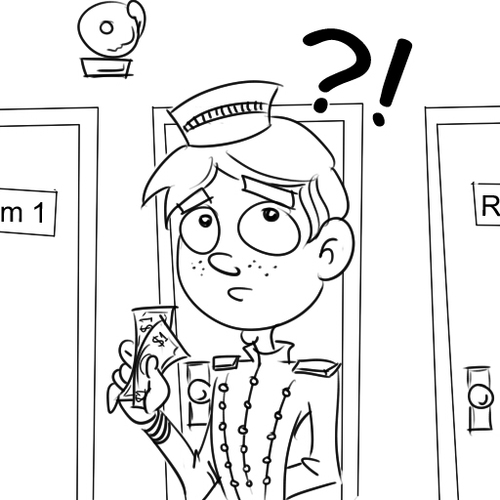The Missing Dollar!
 Three men go to stay at a motel, and the man at the desk charges them $30.00 for a room. They split the cost ten dollars each. Later the manager tells the desk man that he overcharged the men, that the actual cost should have been $25.00. The manager gives the bellboy $5.00 and tells him to give it to the men.
The bellboy, however, decides to cheat the men and pockets $2.00, giving each of the men only one dollar.
Three men go to stay at a motel, and the man at the desk charges them $30.00 for a room. They split the cost ten dollars each. Later the manager tells the desk man that he overcharged the men, that the actual cost should have been $25.00. The manager gives the bellboy $5.00 and tells him to give it to the men.
The bellboy, however, decides to cheat the men and pockets $2.00, giving each of the men only one dollar.
Now each man has paid $9.00 to stay in the room and 3 x $9.00 = $27.00. The bellboy has pocketed $2.00. $27.00 + $2.00 = $29.00 - so where is the missing $1.00?
This section requires Javascript.
You are seeing this because something didn't load right. We suggest you, (a) try
refreshing the page, (b) enabling javascript if it is disabled on your browser and,
finally, (c)
loading the
non-javascript version of this page
. We're sorry about the hassle.
The problem is that the question is always cleverly phrased to conceal what is really going on. Since I don't want to just give you the answer, I'll tell you how I think about it and then you can see if you understand it.
First let's locate all that money. There are two ways to think about how much money is there, and the trick in this question is that it combines the two ways:
a) How much money did the men originally pay? b) How much money did they end up paying? For (a), we need to account for $30. The owner keeps $25, the bellboy gets $2, and the men get $3 back. That adds up fine.
Now let's look at (b). How much money did the men end up paying? $27, of which $25 went to the owner and $2 to the bellboy. That adds up too.
The problem with the question is that the $2 the bellboy gets is already contained in the $27 that the men end up paying, so we shouldn't expect adding that $2 to anything to be meaningful.